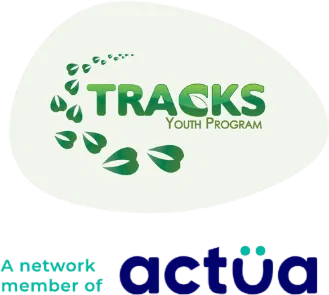Blog: Meet Leah Grimes Outreach and Education, Development and Delivery Position
Hi my name is Leah Grimes! I work for the Outreach and Education Development and Delivery team here at TRACKS. I am currently in my second year at Trent University in the Teacher Education program. I have three passions in life; teaching, environmental sustainability and learning about the truths and culture of Indigenous peoples. I am beyond lucky to be able to harness all of them in the work that I do for TRACKS. I am in awe that I get to do this job and work alongside so many like-minded and wonderful people. Once I started learning about environmental issues it was not something that I could turn away from. I believe that individual efforts have massive impacts. Just take a look at how the fast food industry has adopted plant-based products. That is the result of the collective action of many individuals demanding options that do less harm to the Earth. I try to have as little impact on the environment as I possibly can, and environmental sustainability is something I speak and think about very often. I did not learn about the past and ongoing injustices that Indigenous peoples in Canada have faced until university when I was 18 years old. As a future teacher I hope to do better by my students and introduce them to our country’s history of mistreatment. I believe that reconciliation starts with education and I have taken it on as my responsibility to help as many people learn about this subject. I think that Indigenous perspectives of respect for the land, holistic wellbeing and the balance between all those that are living should be at the forefront of tackling the environmental issues that we are all facing. I hope to prepare youth to demand for a better future by teaching them the value in caring for the land. I applied for TRACKS because they are committed to addressing environmental issues through education in Indigenous and Western sciences. In my first few days of working here I explored the idea of seeing through these two lenses. In a talk by Dr. Leroy Little Bear, he compares the two ideologies. He says that Indigenous sciences are all about uncertainty and are thought about in terms of “continuous happenings.” Everything we know about the world is in flux. We sometimes get bogged down in what we know and forget to explore all the things that we don’t know. As we learn something it becomes very concrete in our minds and then it becomes hard for us to look at it from a different perspective. We need to adapt our way of learning and thinking to be more flexible. We need to always keep in mind that what you are learning is only a portion of the truth. That it is only being perceived in a singular way. As Dr. Little Bear states: “Science is the creation of the perceiver.” If science is the pursuit of the unknown, then we should always be thinking about it in flux because there is much more unknown that there is known. I am so thankful to work for such an amazing program and I cannot wait to continue my work here!
